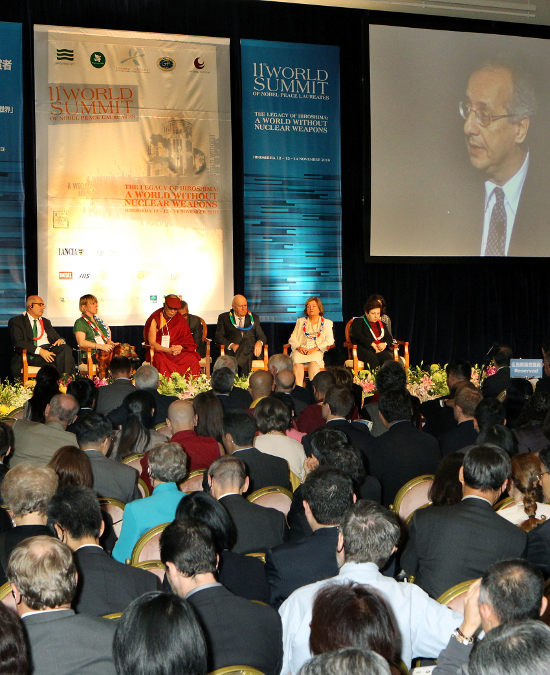World Summit of Nobel Peace Laureates opens with theme “The Legacy of Hiroshima: A World Without Nuclear Weapons”
Nov. 13, 2010
by Yumi Kanazaki, Staff Writer
On November 12, “The 2010 World Summit of Nobel Peace Laureates” opened its proceedings at the Grand Prince Hotel Hiroshima in Minami Ward. The summit, the first such event to be held in Japan, was organized by its secretariat in Rome. Nobel Peace Prize laureates and representatives of Nobel Peace Prize-winning organizations have gathered in the A-bombed city of Hiroshima and are holding discussion under the theme of “The Legacy of Hiroshima: A World Without Nuclear Weapons.” The participants will announce the Hiroshima Final Declaration in Hiroshima Peace Memorial Park in the city center on November 14.
Akihiro Takahashi, 79, former director of Hiroshima Peace Memorial Museum and an A-bomb survivor, related his horrific experience of the atomic bombing at the opening ceremony, and called on the Nobel Peace Prize laureates, including the 14th Dalai Lama, the supreme leader of Tibetan Buddhism, to demonstrate leadership in pursuit of the elimination of nuclear weapons.
Discussion was held at three sessions. At the session entitled “The Legacy of Hiroshima,” former South African president Frederik Willem De Klerk pointed to his experience of having made the decision to abandon nuclear weapons in his nation and stressed the prospect of other nations abandoning their nuclear weapons as well. At another session, Jody Williams, an American anti-landmine activist, addressed the audience, arguing that nuclear abolition could not be achieved unless citizens took action.
Wuer Kaixi, a former student leader in the pro-democracy protests at Tiananmen Square, attended the summit in place of China’s Liu Xiaobo, the jailed pro-democracy activist and this year’s Nobel Peace Prize laureate, and called for Mr. Liu’s release. A proxy of Aung San Suu Kyi, the pro-democracy leader in Myanmar who has been under house arrest, also read out a statement appealing for the release of Ms. Suu Kyi.
On November 13, the second day of the summit, the participants will continue their discussions at three sessions, including the session “Progress towards a world without nuclear weapons: the result of the ongoing international negotiations and the role of Cities and of Civil Society.”
Among the Nobel Peace Prize laureates participating in the summit are the 14th Dalai Lama, Mr. De Klerk, Ms. Williams, Mohamed ElBaradei, former director general of the International Atomic Energy Agency (IAEA), Shirin Ebadi, an Iranian human rights activist, and Mairead Maguire, a peace activist from Northern Ireland. Mikhail Gorbachev, former president of the Soviet Union, and Lech Walesa, former president of Poland, have had to cancel their planned participation due to health concerns. Representatives of 13 Nobel Peace Prize-winning organizations are also attending the summit.
(Originally published on November 13, 2010)
On November 12, “The 2010 World Summit of Nobel Peace Laureates” opened its proceedings at the Grand Prince Hotel Hiroshima in Minami Ward. The summit, the first such event to be held in Japan, was organized by its secretariat in Rome. Nobel Peace Prize laureates and representatives of Nobel Peace Prize-winning organizations have gathered in the A-bombed city of Hiroshima and are holding discussion under the theme of “The Legacy of Hiroshima: A World Without Nuclear Weapons.” The participants will announce the Hiroshima Final Declaration in Hiroshima Peace Memorial Park in the city center on November 14.
Akihiro Takahashi, 79, former director of Hiroshima Peace Memorial Museum and an A-bomb survivor, related his horrific experience of the atomic bombing at the opening ceremony, and called on the Nobel Peace Prize laureates, including the 14th Dalai Lama, the supreme leader of Tibetan Buddhism, to demonstrate leadership in pursuit of the elimination of nuclear weapons.
Discussion was held at three sessions. At the session entitled “The Legacy of Hiroshima,” former South African president Frederik Willem De Klerk pointed to his experience of having made the decision to abandon nuclear weapons in his nation and stressed the prospect of other nations abandoning their nuclear weapons as well. At another session, Jody Williams, an American anti-landmine activist, addressed the audience, arguing that nuclear abolition could not be achieved unless citizens took action.
Wuer Kaixi, a former student leader in the pro-democracy protests at Tiananmen Square, attended the summit in place of China’s Liu Xiaobo, the jailed pro-democracy activist and this year’s Nobel Peace Prize laureate, and called for Mr. Liu’s release. A proxy of Aung San Suu Kyi, the pro-democracy leader in Myanmar who has been under house arrest, also read out a statement appealing for the release of Ms. Suu Kyi.
On November 13, the second day of the summit, the participants will continue their discussions at three sessions, including the session “Progress towards a world without nuclear weapons: the result of the ongoing international negotiations and the role of Cities and of Civil Society.”
Among the Nobel Peace Prize laureates participating in the summit are the 14th Dalai Lama, Mr. De Klerk, Ms. Williams, Mohamed ElBaradei, former director general of the International Atomic Energy Agency (IAEA), Shirin Ebadi, an Iranian human rights activist, and Mairead Maguire, a peace activist from Northern Ireland. Mikhail Gorbachev, former president of the Soviet Union, and Lech Walesa, former president of Poland, have had to cancel their planned participation due to health concerns. Representatives of 13 Nobel Peace Prize-winning organizations are also attending the summit.
(Originally published on November 13, 2010)








